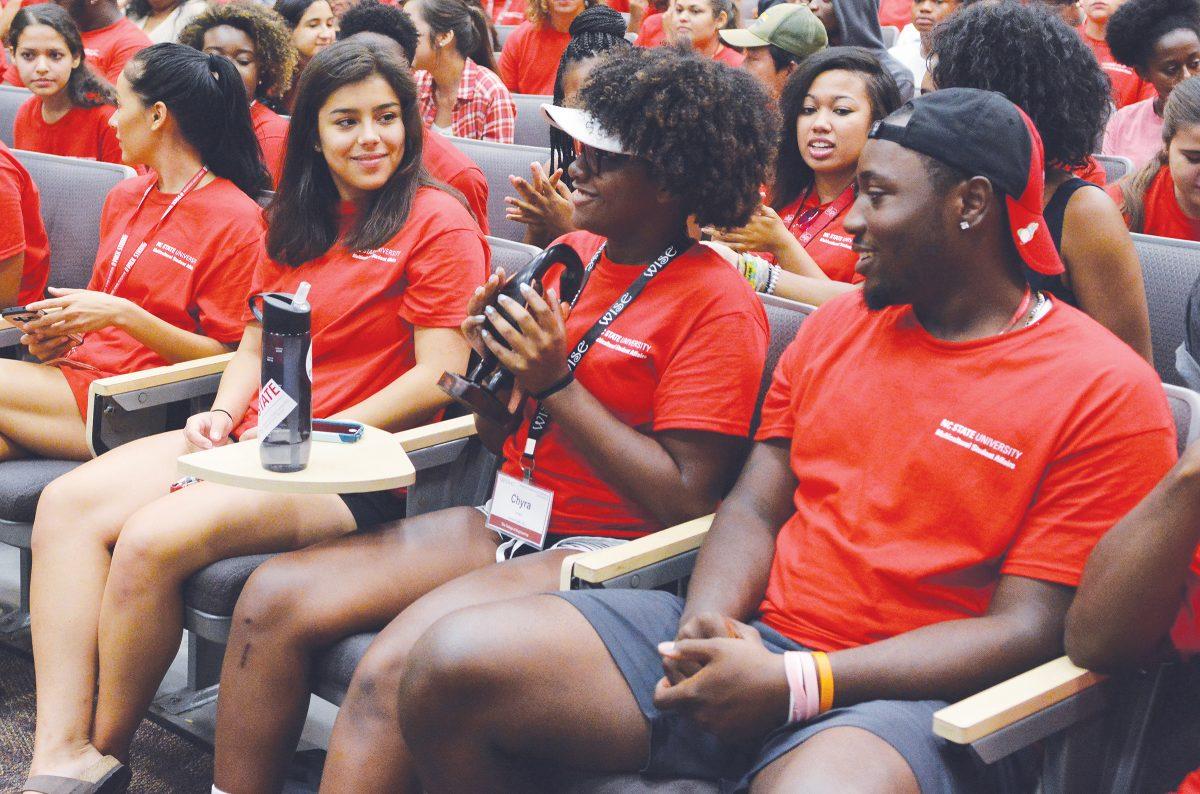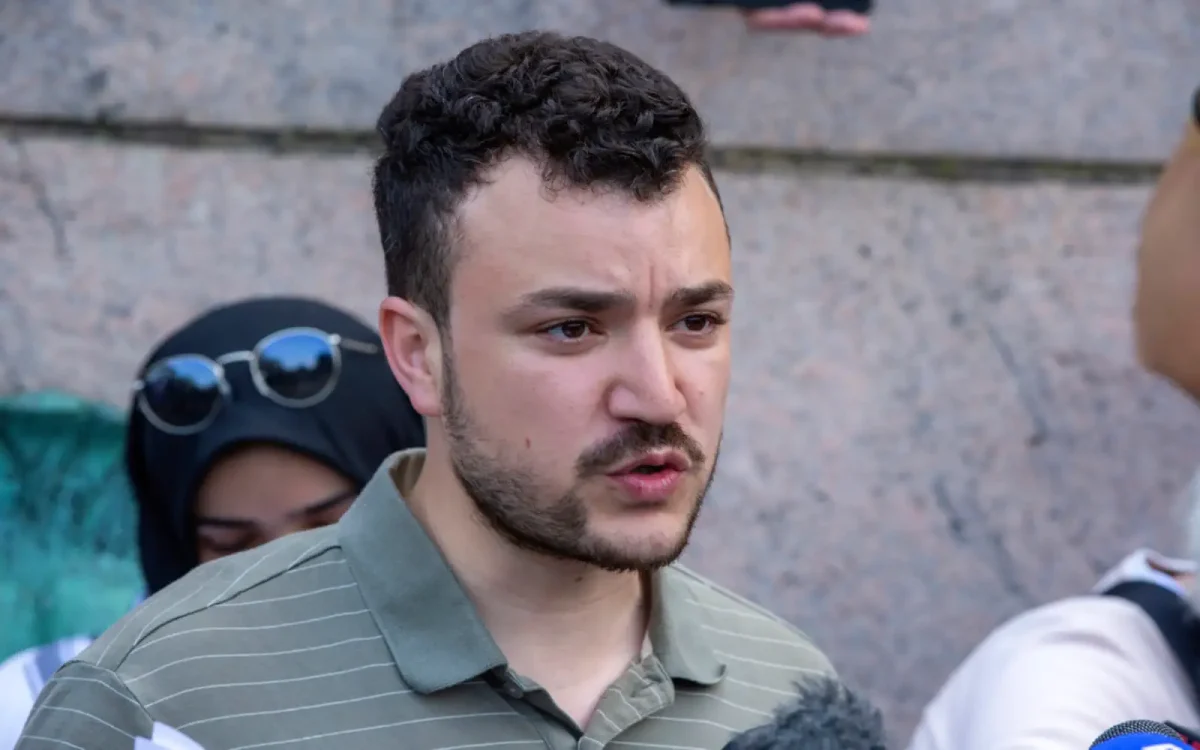Chyra Savage, a freshman studying engineering, holds the Sankofa bird, a commemorative gift to the African American Cultural Center and symbol which represents responsibility, knowledge, love and community, while Andrea Sanchez-Zarate, a freshman studying engineering, and Will Comer, a freshman studying biological sciences, look on during the 2016 Symposium for Multicultural Scholars at the Witherspoon Cinema Friday, Aug. 12. The bird was distributed by Toni Thorpe, Program Coordinator of the African American Cultural Center and was passed around through the audience.
Keilah Davis | Managing Editor
In July 2001, less than 10 years after the first edition of the Nubian Message was published, Multicultural Student Affairs (MSA) was founded at NC State.
Dr. Tracey Ray, assistant vice provost for student diversity, served as the inaugural director of MSA and held the position for 10 years.
MSA’s predecessor, African American Student Affairs (AASA), was founded in 1984 after the launching of the Peer Mentor Program and African American Symposium. In addition to overseeing these two initiatives, AASA started the annual Kwanzaa celebration and co-advised the National Pan-Hellenic Council.
“African American Student Affairs evolved into one unit that was an expansion of diversity efforts at NC State,” Ray said.
In 2000, Ray was asked to write a proposal for an office that could serve African American, Native American and Latinx students. Her proposal coined the name “Multicultural Student Affairs” and included the original structure and budget for MSA.
A year later, MSA was formed. According to Ray, the first priority she had as director was to hire an assistant director to serve Native American students.
“That was the population that had the greatest needs relative to student retention,” Ray said. “Also, Native students had been asking for a program and an office for over 10 years.”
The position was originally named the Assistant Director for Native American and Hispanic Student Affairs. According to Ray, the shift in North Carolina’s demographics and demands of NC State’s Hispanic and Latinx students ultimately led to the creation of both an assistant director for Hispanic student affairs and an assistant director for Native American affairs in 2009.
“Programs and services have historically been created out of a need,” Ray said. “We are a research institution. Research and assessment are important in terms of getting things funded and having them be sustainable over time.”
Ray was also responsible for fundraising approximately 60% of MSA’s annual budget during its early years through grants and strategic co-sponsorships of programs. MSA is now primarily supported through student fees.
MSA’s original staffing structure, which included a director and three race-specific assistant directors, has remained largely the same until last year.
Reggie Barnes is the senior director of campus community centers, which includes the GLBT Center, Women’s Center, African American Cultural Center and MSA. Barnes has led the current restructuring of these centers.
This is the second year of a three-year restructuring plan for all four centers. Some key focuses of 2017, the second year of the restructuring plan, are assessing community needs, filling open positions and clarifying the connections between the centers’ missions and NC State’s institutional priorities.
Barnes said he began by meeting with leaders from Asian, Native American, African American and Latinx student organizations to get a sense of “how the centers have not supported them, how the university has not supported them and then getting a sense of their needs.”
Five open positions across the centers have been filled thus far, including a director and program assistant within the African American Cultural Center and a director and assistant director within MSA.
The community centers will be assessed based on standards published by the Council for the Advancement of Standards in Higher Education. According to Barnes, these standards are “best case scenarios that would make for a stronger office in any area for higher education.”
“Our work didn’t change, but how we do it and communicate our value has changed,” Barnes said.
For MSA, this means adopting functional titles for its assistant directors. The three assistant director positions for African American student affairs, Hispanic/Latino student affairs and Native American student affairs have formally been changed to assistant director positions for student transition and success, community outreach and engagement and intercultural initiatives, respectively.
Although the titles have changed, Barnes says the culturally-specific responsibilities of MSA have not.
“These positions still oversee the student organizations,” Barnes said. “They still coordinate the cultural celebrations. That has never changed.”
According to Barnes, budget cuts tend to target programming offices. Therefore, clarifying the responsibilities of MSA and its assistant directors was key to ensuring institutional support for MSA. “These changes were made for sustainability,” Barnes said.
These changes also align with MSA’s increased focus on retention, student success, community outreach and degree completion.
The restructuring plan also includes developing a full-time position within MSA for supporting Asian American and Pacific Islander students. The functional title for this position has not yet been decided.
The next stage of restructuring the community centers will involve developing a strategic plan and a three-year assessment plan.
According to Barnes, the ultimate goal of these changes is “to advance diversity and inclusion and also protect diversity and inclusion” at NC State.





